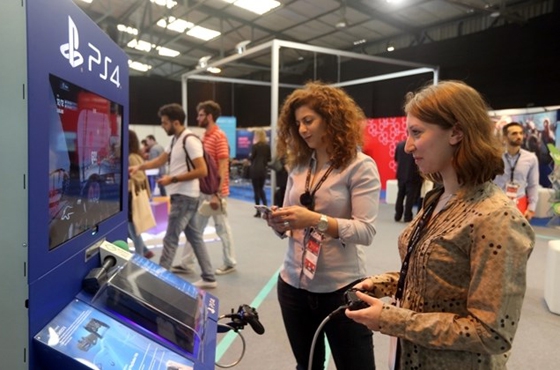Diverse talents need to come together to improve the games-development industry in Lebanon and the region, said experts at the MENA Games Conference 2016. “The biggest challenge we are facing today is lack of cooperation among talented people,” Vincent Ghossoub, co-founder and CEO of Falafel Games, told The Daily Star on the sidelines of the event.
Organizers the IFP Group hope the two-day conference, which is taking place at the Mar Mikhael Historical Train Station, will help grow the regional gaming industry.
Ghossoub explained that, for instance, one can find a great artist working in a creative agency and a good programmer working for a bank but if they come together they can build a very successful game.
He said that one way to bring these people together is through concepts such as U.K. Lebanon Tech Hub, which is an international initiative by Lebanon’s Central Bank and the United Kingdom through its embassy in Beirut. The hub aims at fostering a partnership between Lebanon and the U.K., focusing on mutual learning, exchange and collaboration among companies in the private sector in the two countries.
Ghossoub is also looking to join forces with other startups. “We are working with other game companies to get closer together in a bid to share our knowledge,” Ghossoub said. “We are trying to organize community events where we see more of these game developers while giving them the chance to communicate together and share expertise.”
Likewise, Mohamed El Saadi, partner-development manager at Google Play, believes that a successful game comes as a result of different skills coagulating together. “When you see a great game, this means that people with different talents in arts and design, technology and marketing, came together to create a successful product,” he said.
For Saadi, one of the biggest challenges facing game developers in Lebanon is the ability to find high-caliber engineers with great talents. “When it comes to creating a game, you are not really competing with local developers anymore but also with global players,” he said. “This is a big challenge especially for small developers in the region.”
Saadi’s comments were echoed by Ghossoub who said that Lebanon has a good number of engineers but they are not game oriented. “We have engineering talents in Lebanon but most of them are not modeled for games,” he said. “I cannot hire an engineering graduate and ask him to develop a game right away because there are technicalities that need to be learned,” he added.
Ghossoub said that the lack of proper Internet connectivity is one of the many challenges facing the gaming industry. “This is a huge problem and all kinds of businesses need Internet to be able to grow and expand worldwide,” he said.
“We cannot make any business plans for the future if we do not have proper Internet connectivity because we need it to achieve a big part of our work,” he added.
Saadi repeated Ghossoub’s remark by saying that Internet is key to developing games.
“When you’re building a game, you’re not just sitting behind the laptop but you also need to reach out to resources while checking what other people are doing,” he said.
Saadi said that fiber-optics within the country will surely improve connectivity, but he emphasized the need to also connect Lebanon to the rest of the world by using proper submarine cables.
Telecommunications Minister Boutros Harb last July unveiled a five-year plan to revamp Lebanon’s telecoms infrastructure to assure that Internet users across the country would enjoy fiber-optic connectivity by the year 2020.
“We are building fiber-optics but it will take some time,” said Naji Abboud, who was representing Harb at the event.
“We are keen on a building state-of-the-art network to enable Lebanon to regain its attractiveness, allowing Lebanese entrepreneurs to export their creativity abroad,” Abboud said. “We also want to work on attracting companies to come and invest in the country while creating job opportunities and boosting the economy.”
Abboud said in his speech that the ministry will cover Lebanon with 4G very soon, followed by 5G in the coming few years.
Marwan Hayek, CEO of Alfa, said that Alfa’s goal is to secure a proper infrastructure to all developers allowing them to unleash their potential. “We have embarked in a new journey by deploying a new nationwide LTE advanced 4.5G network that will cover 99.9 percent of Lebanon through the deployment of 13,000 stations providing speed that is up to 300 Mbps,” he said.
Hayek also gave some statistics, saying that one-third of the world’s population carries 2.5 billion smartphones while generating annual sales revenues of $400 billion by the end of 2015.
“This provides an excellent opportunity for talented people to tap into the gaming industry and take the business further beyond numbers reached in previous years,” he said.
The Daily Star
14 April























































